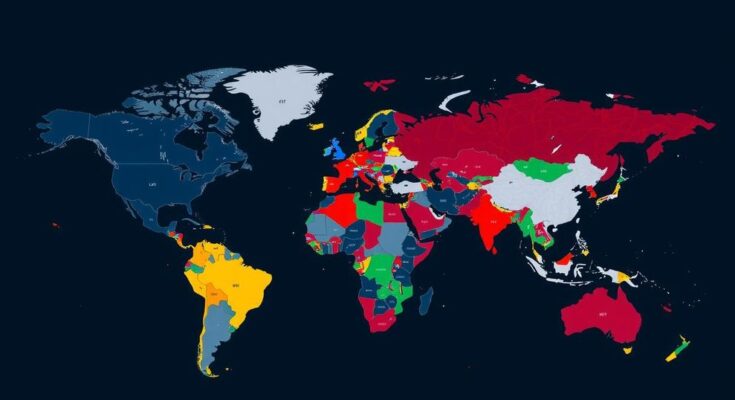The ranking of the world’s most advanced countries in 2024 highlights South Korea, the United States, and Denmark as leaders in technology and innovation. Evaluated by metrics such as internet access, research investment, and the capacity for innovation, these nations exemplify commitment to education and industrial growth. Their collaborative efforts foster economic prosperity and improvement in everyday life.
In 2024, South Korea is acknowledged as the most advanced country in the world, reflecting a significant commitment to technological advancement and innovation. The United States and Denmark follow closely in the rankings. This assessment, compiled by Global Finance Magazine, is derived from metrics that include the percentage of internet and LTE users, the capacity for innovation, and the investment in research and development as a proportion of GDP.
South Korea exemplifies an exemplary model of technological leadership, boasting superior internet access and a robust culture of research and development. The population’s high level of technological literacy has incentivized advancements in artificial intelligence and robotics. Major corporations, such as Samsung and LG, substantiate the nation’s dedication to advancing technology, supported by extensive government research funding.
Following South Korea, the United States retains its historical prestige in technological breakthroughs and innovation, contributing significantly to research and development. The country’s academic powerhouses like MIT and Stanford produce world-class talent that drives multinational companies such as Apple and Google, known for shaping contemporary technology. Notably, the United States allocates 3.46% of its GDP to research, demonstrating its unwavering support for pioneering technological advancements.
Denmark emerges as a prominent player in the tech landscape, driven by a collaborative environment and an emphasis on green energy and biotechnology. Danish firms, such as Vestas, push forward sustainable initiatives. The welfare system promotes equitable access to education and nurtures a skilled labor force, further reinforcing the nation’s commitment to innovation.
Switzerland’s technological progress stems from its strong educational institutions and a commitment to supporting new ventures, exemplified by research centers like ETH Zurich. The country’s historical stability has attracted global corporations, thereby enhancing its innovative output in various fields, including pharmaceuticals and nanotechnology.
Israel capitalizes on its culture of adaptability and innovation, primarily aimed at developing advanced defense technologies and efficient resource management. The government’s investment in startups and partnerships with academic institutions fosters a vibrant ecosystem for new technologies. Companies such as Mobileye and Waze exemplify Israel’s pioneering spirit in transforming transportation solutions.
Finland, through companies like Nokia, enhances global telecommunications and stands firm in clean energy advancements. The Finnish education system emphasizes technical training, preparing its population for the demands of the technology sector. The concept of “sisu,” summarizing a national ethos of resilience, propels Finland towards continuous technological adaptation and economic innovation.
The Netherlands exemplifies technological success through the cultivation of talented graduates and a tradition of trade. Dutch companies like ASML and Philips are global leaders impacting numerous technological domains, from semiconductors to healthcare. The collaborative spirit that permeates the educational system fosters an entrepreneurial environment conducive to tech advancement.
Sweden’s technological landscape benefits from its well-educated populace and strong government support for innovation, evident in successful firms like Spotify and Ericsson. The country consistently adopts cutting-edge technology, focusing on sustainability and digital solutions that streamline everyday transactions.
Norway is recognized for its substantial investments in research and its commitment to sustainability. The preeminence in green energy, facilitated by an emphasis on hydropower and electric vehicle adoption, showcases Norway as a global model in environmental responsibility and innovation.
Singapore’s strategic emphasis on research and development has positioned it as a technology leader within Asia. Its government’s substantial investment in technology education and the promotion of lifelong learning contribute to a driving innovative spirit, making significant advancements in biotechnology and financial technologies.
The United Kingdom’s technological endeavors are marked by the contributions of organizations like AstraZeneca and DeepMind, exemplifying advancements in biotechnology and AI. The UK invests significantly in emerging technologies, reinforcing its competitive edge in a rapidly evolving global landscape.
Belgium continues to advance technologically, competing favorably against other nations through investments in various sectors, including cybersecurity and renewable energy. Prominent companies such as Solvay contribute to sustainable innovations, enhancing Belgium’s prospects in the global tech arena.
The assessment of the world’s most advanced countries in 2024 is crucial in understanding the global landscape of innovation and technology. As societies evolve, recognizing the nations that lead in technological advancements highlights effective strategies, educational initiatives, and investment practices that drive economic growth and improve living standards. Countries like South Korea, the United States, and Denmark set benchmarks in various technological domains through their commitment to education, research, and development. Understanding the ranking and strengths of these nations helps illustrate how diverse resources and cooperative frameworks contribute to technological progress. The criteria utilized in the evaluation, including internet accessibility, innovation capacity, and research investment, showcase the multifaceted nature of advancement in the modern world. This comparative analysis serves as a guide for assessing national competitiveness in the global economy.
In conclusion, the comprehensive evaluation of the twelve most advanced countries in 2024 reveals a shared commitment to fostering innovation, scientific exploration, and collaboration. By investing in education and research, these nations have crafted sectors that not only advance their economies but also enhance the quality of life for their citizens. The ongoing developments across these countries indicate that technological progress is a collective journey that thrives through cooperation, knowledge exchange, and sustained investment in future opportunities.
Original Source: www.worldatlas.com




